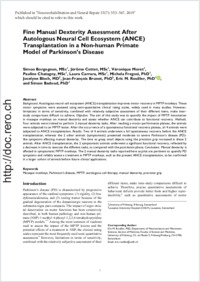Fine manual dexterity assessment after autologous neural cell ecosystem (ANCE) transplantation in a non-human primate model of parkinson’s disease
- Borgognon, Simon University of Fribourg, Fribourg, Switzerland
- Cottet, Jérôme University of Fribourg, Fribourg, Switzerland
- Moret, Véronique University of Fribourg, Fribourg, Switzerland
- Chatagny, Pauline University of Fribourg, Fribourg, Switzerland
- Carrara, Laura University of Fribourg, Fribourg, Switzerland
- Fregosi, Michela University of Fribourg, Fribourg, Switzerland
- Bloch, Jocelyne Lausanne University Hospital (CHUV), Lausanne, Switzerland
- Brunet, Jean-François Lausanne University Hospital (CHUV), Lausanne, Switzerland
- Rouiller, Eric M. University of Fribourg, Fribourg, Switzerland
- Badoud, Simon University of Fribourg, Fribourg, Switzerland
-
01.07.2019
Published in:
- Neurorehabilitation and Neural Repair. - 2019, vol. 33, no. 7, p. 553–567
English
Autologous neural cell ecosystem (ANCE) transplantation improves motor recovery in MPTP monkeys. These motor symptoms were assessed using semi-quantitative clinical rating scales, widely used in many studies. However, limitations in terms of sensitivity, combined with relatively subjective assessment of their different items, make inter-study comparisons difficult to achieve. Objective. The aim of this study was to quantify the impact of MPTP intoxication in macaque monkeys on manual dexterity and assess whether ANCE can contribute to functional recovery. Methods. Four animals were trained to perform 2 manual dexterity tasks. After reaching a motor performance plateau, the animals were subjected to an MPTP lesion. After the occurrence of a spontaneous functional recovery plateau, all 4 animals were subjected to ANCE transplantation. Results. Two of 4 animals underwent a full spontaneous recovery before the ANCE transplantation, whereas the 2 other animals (symptomatic) presented moderate to severe Parkinson’s disease (PD)-like symptoms affecting manual dexterity. The time to grasp small objects using the precision grip increased in these 2 animals. After ANCE transplantation, the 2 symptomatic animals underwent a significant functional recovery, reflected by a decrease in time to execute the different tasks, as compared with the post-lesion phase. Conclusions. Manual dexterity is affected in symptomatic MPTP monkeys. The 2 manual dexterity tasks reported here as pilot are pertinent to quantify PD symptoms and reliably assess a treatment in MPTP monkeys, such as the present ANCE transplantation, to be confirmed in a larger cohort of animals before future clinical applications.
- Faculty
- Faculté des sciences et de médecine
- Department
- Département de Médecine
- Language
-
- English
- Classification
- Biological sciences
- License
- License undefined
- Identifiers
-
- RERO DOC 326987
- DOI 10.1177/1545968319850133
- Persistent URL
- https://folia.unifr.ch/unifr/documents/307910
Statistics
Document views: 80
File downloads:
- rou_fmd.pdf: 211
